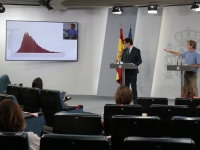Politics
Spain leaves the state of alarm this Sunday
Maintains some measurements
USPA NEWS -
Spain recovers this Sunday the normality lost more than three months ago due to the coronavirus pandemic. Not absolutely or uniformly throughout the territory, but there are no longer movement restrictions or other prohibitions that have helped contain the pandemic.
Regions such as Madrid, with contagion figures still high, will maintain for some more days, until mid-July, some capacity restrictions in public spaces and some movement limitations. But practically all of Spain recovers the freedom lost with the pandemic. Only the use of a mask on public transport and in all situations in which it is impossible to maintain the safety distance of 1.5 meters is mandatory until there is a vaccine. All other rights restricted during the last three months are recovered this Sunday: the rights of assembly, movement and opening of shops, bars and restaurants, among others.
Although for two weeks, with the move to phase 3 of the deconfinement process and the transfer to the regional authorities of the control of said phase, some regions have relaxed the prohibitions on confinement, it is at midnight this Saturday that Spain is left out of the alarm state. A week ago, the region of Galicia was a pioneer in ending the state of alarm and allowing movements between its four provinces and the free activity of its citizens. On Friday, the regions of the Basque Country and Cantabria (north coast of Spain) opened their common border. But others have preferred to wait for the alarm state to end. This is the case of La Rioja, bordering the Basque Country, Navarra, Aragon and Castilla y León, which has preferred to wait for the end of the lack of confinement to allow the travel of its citizens. La Rioja was, at the beginning of the pandemic, the region with the highest number of infections per 10,000 inhabitants, but in recent weeks the situation has changed: it has been eleven days without deaths from coronavirus and with between zero and three new infections daily.
According to the socialist president of the La Rioja regional government, Concha Andreu, it was "better to wait" for the end of the state of alarm and not jeopardize what was achieved in the fight against the pandemic. A decision shared by other regions such as Catalonia, whose authorities have been cautious when changing phases due to the high numbers of contagion in the city of Barcelona. And Madrid, which leads the ranking of infections and deaths in Spain, and which reaches the end of the state of alarm without leaving phase 2 of the de-escalation. For this reason, the Madrid regional government has decreed the maintenance of certain restrictions until mid-July.
According to the latest data provided by the Spanish Government, the end of the state of alarm is reached with 28,315 deaths and 245,575 infected in Spain. The problem, the opposition in Parliament says, is the number of deceased does not coincide with the death records in official statistics. Until Friday, the head of the Office of Sanitary Emergencies, Fernando Simón, admitted that there are 13,000 deaths that have not been accounted for because, with the current system, it has not been possible to confirm that they have died from coronavirus. The actual death toll could exceed 41,000.
Liability for this article lies with the author, who also holds the copyright. Editorial content from USPA may be quoted on other websites as long as the quote comprises no more than 5% of the entire text, is marked as such and the source is named (via hyperlink).






